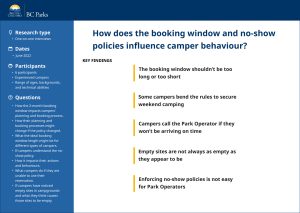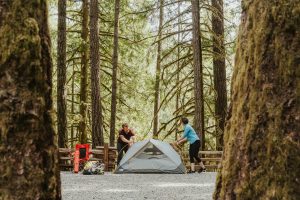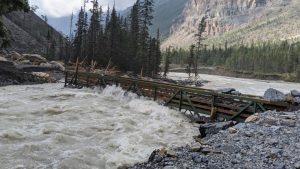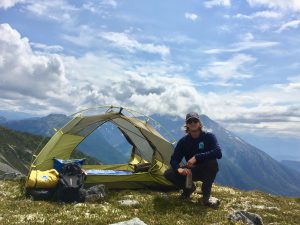How can we make it easier to reserve camping?
Categories:
In the past year, BC Parks has established a program of ongoing design research that gives us direct access to feedback from the people who use our services. This blog is the newest part of that program – this is where we share what we’ve learned.
In this post, we share research findings about the new camping reservation site.
In April and May 2022, we conducted usability testing on the site and we also ran a satisfaction survey to find out how well the new site is performing and where it needs improvement.
Just so we’re clear on this:
- When we talk about the camping reservation site, we mean the website that people use to book and pay for their camping trips.
- This can be confusing because we also have the BC Parks website, which provides detailed information about each park and the BC Parks organization.
- We also currently have a third site, the redesigned BC Parks website, which we are in the process of building to replace the current BC Parks website.
Yes, we are working towards a more streamlined future in which users don’t have to keep track of so many sites!
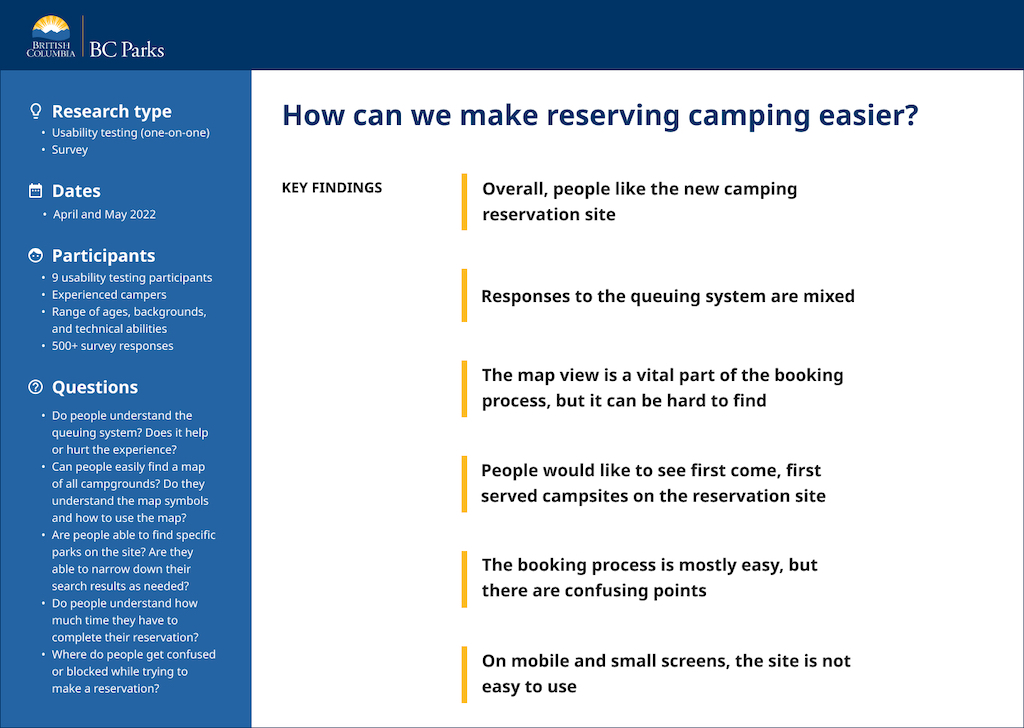
What questions were we trying to answer?
We asked research participants to do a series of tasks on the reservation site while we watched, listened, and asked questions. We wanted to learn:
- Can people easily find a map of all campgrounds? Do they understand the map symbols and how to use the map?
- Are people able to find specific parks on the site? Are they able to narrow their search results as needed?
- Do people know how much time they have to complete their reservation? Are they aware that there is a time limit?
- Where do people get confused or blocked while trying to make a reservation?
In every conversation we have about the camping reservation site, we also learn about other activities that are part of planning a camping trip. We have included findings not directly related to the reservation site at the end of this post.
This post does not include our findings about camping policy (like the 2-month booking window, no-shows, refunds, and cancellations). We’ll share those findings in our next blog post.
What were our key findings about the new camping reservation site?
Overall, people like the new site
“I think you guys have done a great job and it works really well for me.” – Research participant
“Love the new reservation system! Thank you for listening to British Columbians and making the changes.” – Survey respondent
“I am beyond happy that the new site is up and running! It was so easy making a reservation this year!” – Survey respondent
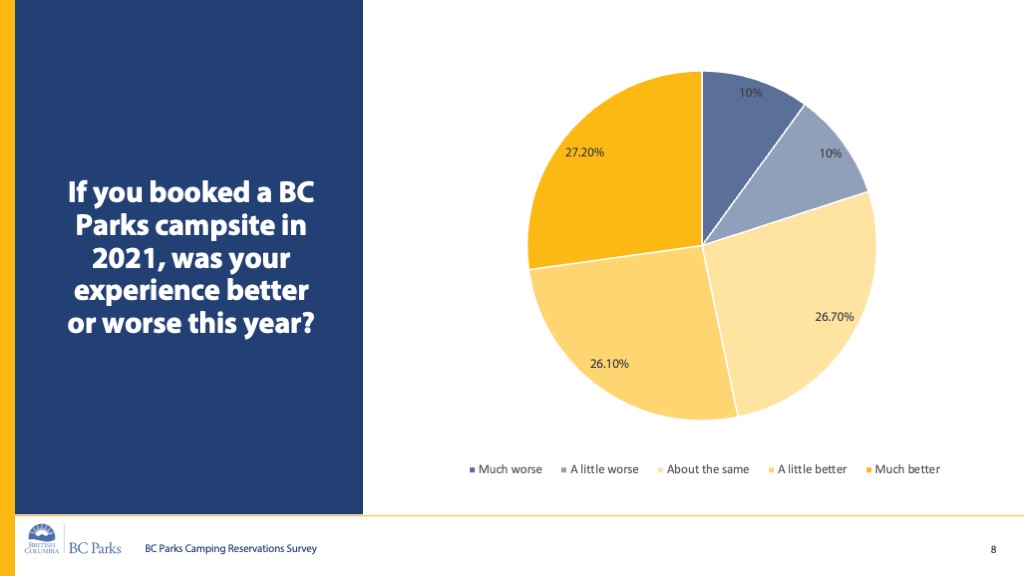
But not everyone is happy with the changes…
“This system is the most user-UNFRIENDLY site known to man. I’m computer literate and still cannot navigate this ridiculous site.” – Survey respondent
Responses to the queuing system were mixed
On the first day of reservations in 2022, we used a queuing system to help manage the traffic on the site. People who arrived at the site before 7 am were assigned a random number and were allowed to enter the site in the order of their assigned number.
“The queue worked great, and I really wish you’d consider using it for all the big weekends. It saved us a lot of stress and was very easy to use.” – Survey respondent
“Queue system is terrible! I used to get up early and put in the work to get my sites. Now it’s a lottery if I camp this year.” – Survey respondent
Key findings:
- Some people loved the queue and others hated it. In general, people who got a low number in the queue and were able to book their chosen campsites were happy with the queuing system. People who got a high number and were not able to book did not like it.
- Some people felt that the queue reduced the overall stress of the booking experience.
- Some felt that the queue increased the fairness of the system, giving everyone an equal random chance of getting their chosen campsites.
- Some people who did not like the queue said that they preferred getting up early and actively refreshing their screen while waiting for reservations to open.
The map view is a vital part of the booking process, but it can be hard to find
“I like the map view better because I get a better understanding of how far it is away from my home.” – Research participant
Key findings:
- Campers want a map that shows the whole camping system so they can use that as a starting place for planning.
- About half of our research participants had trouble finding the map that shows all campgrounds in B.C. on the reservation site.
- People understand the meaning of most of the colored dots used on the map.
- Participants were able to discover that orange dots mean “restrictions”. However, they do not fully understand what “restrictions” means.
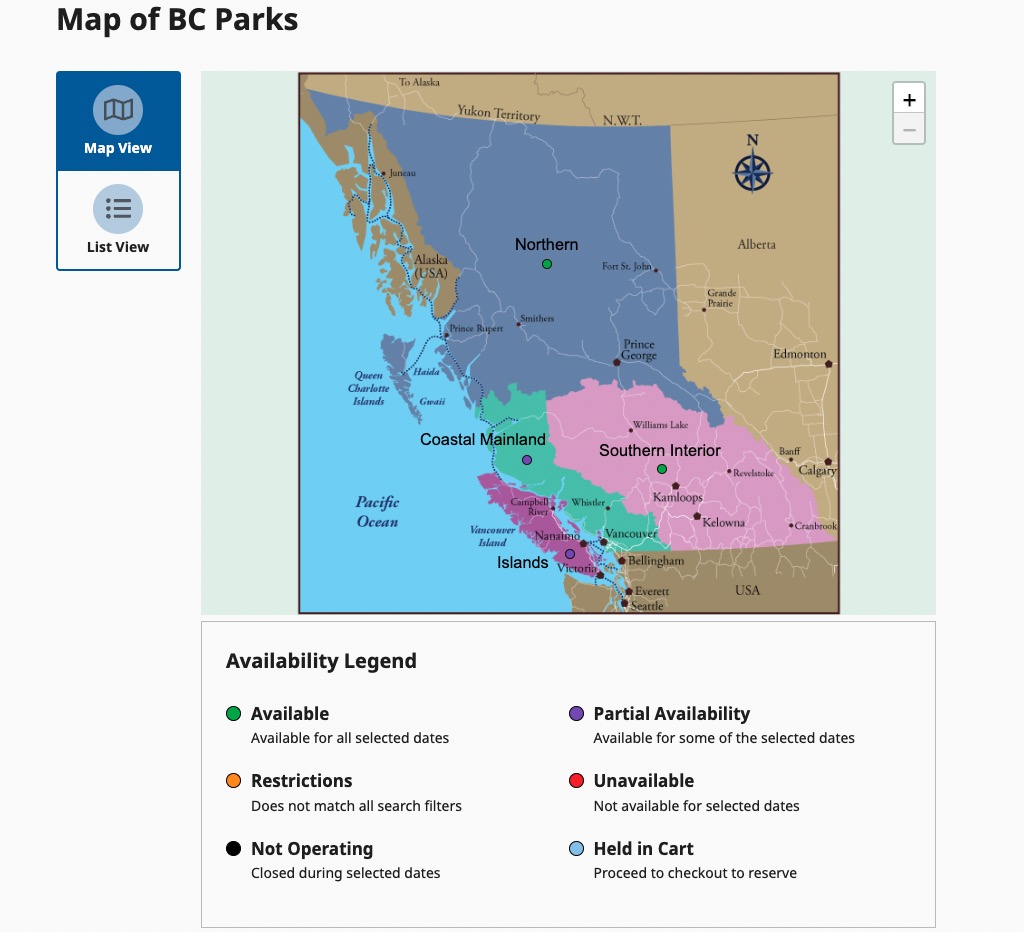
People would like to see first come, first served campsites on the reservation site
“My biggest beef with this reservation system right now is that it doesn’t show first come, first served.” – Research participant
Key findings:
- People want to see on the map which sites within a campground are first come, first served.
- Campers would like a real-time indicator or how many first come, first served sites are unoccupied in a campground. (While we love this idea, it’s a tough one to make happen because so many campgrounds do not have internet or cell service. Without being online, park staff have no way of keeping this information up to date.)
The booking process is mostly easy, but there are confusing points
“I had no idea you could book multiple sites. I always would go back out of the system and back in.” – Research participant
Key findings:
- It is not clear at what point in the reservation process a chosen campsite is secure. Many people assume that until the payment goes through, they might lose their site to someone else.
- People are not sure how long they have to complete their booking once a campsite is in their shopping cart. Many assume they must move as quickly as possible to avoid losing the site.
- It’s not clear how many campsites can be booked at one time, and some participants did not know it was possible to book more than one.
- People don’t expect to enter party size and discount information so late in the booking process. Many assume they have missed a step and go back to try and correct their “error” before continuing.
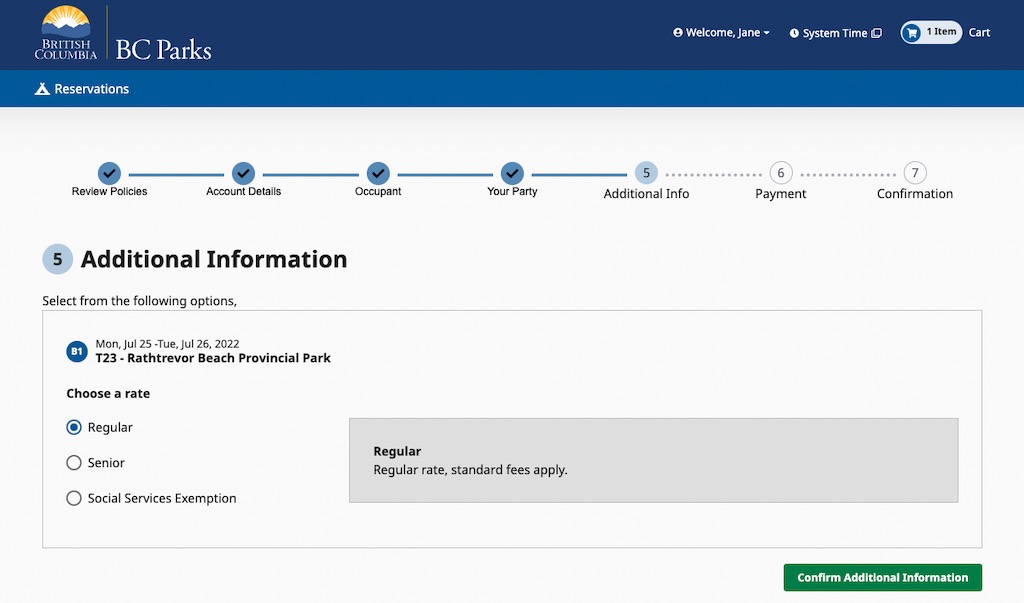
On mobile and small screens, the site is not easy to use
Key findings:
- Most participants use a laptop or desktop computers to make their reservations.
- The map on mobile is too small to be useful.
- On small screens, the tap targets (icons, buttons, etc.) are too small and too close together to be usable.
- Action buttons (such as the Reserve button) may not be easy to find when using a mobile device, making it more difficult to reserve a site.
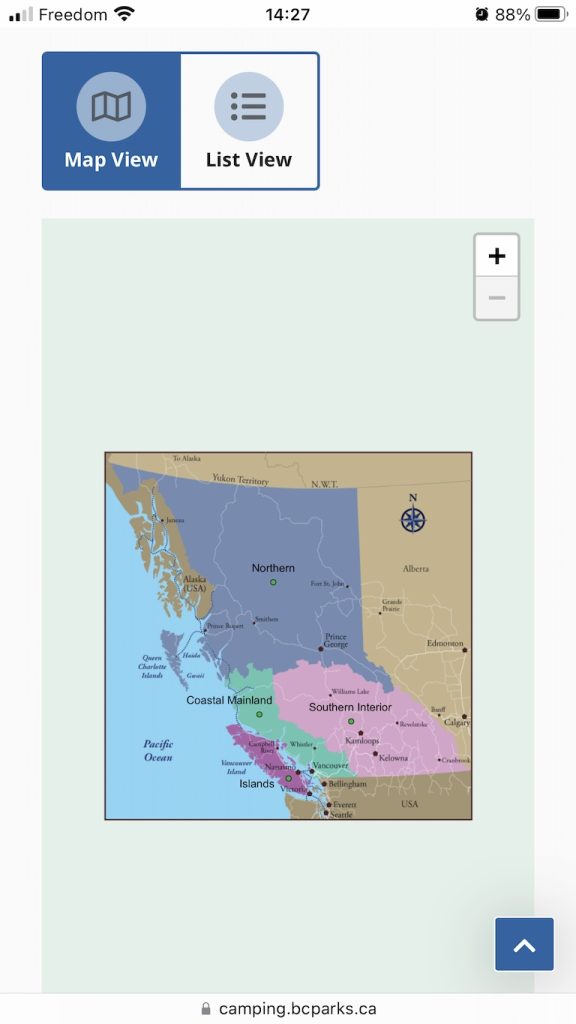
What did we do with these findings?
Because our camping reservation site is provided by a (great) partner, Canadian-based Camis, our process for making improvements is different than it is for sites built and maintained by BC Parks’ in-house digital team. For our in-house products, it is easier for us to prioritize and act quickly.
With Camis, which provides services to multiple clients, there are additional considerations and constraints. We take these considerations into account when prioritizing the work. Once we’ve prioritized, we work with Camis to add the feedback to their backlog (a techie term for a to-do list) and tackle each item according to priority.
What else did we discover (or confirm) during this research?
Fairness and equity are important to most people
“It feels like there’s some kind of insiders’ knowledge in order to reserve a campsite. That’s inherently unfair. It should be very simple and straightforward. That’s fair.” – Inexperienced camper
Key findings:
- People want fair access to parks and reservations for all people in B.C.
- People feel that everyone should have an equal chance of making a reservation, no matter their technical abilities or knowledge about the parks.
- People are more likely to see the system as unfair when they are unable to book the campsite they want. When they get their desired campsite, they are more likely to see the system as fair.
Limited camping availability makes the reservation process stressful
“I feel for B.C. families that have specific dates and are trying to book in competition with the rest of the world.” – Experienced camper
Key findings:
- The limited number of campsites in popular locations continues to make the reservation process frustrating and stressful.
- The knowledge that there is a lot of competition for campsites adds to the stress of the booking experience.
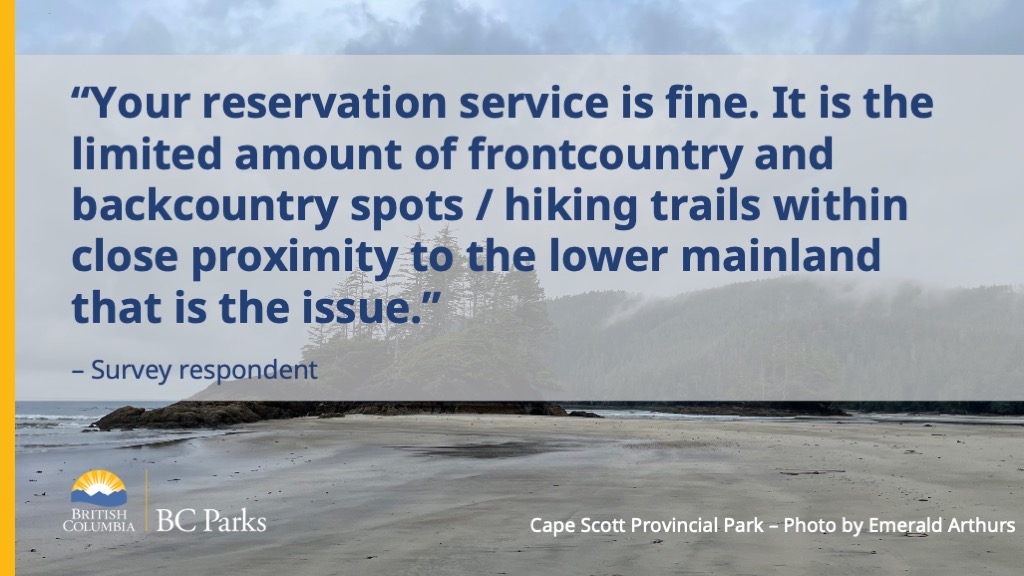
Campers want to be able to get support by phone for complex problems and questions
“For support I’m more of a phone user since I like talking to people. Typing all your issues is time consuming.” – Backcountry camper
Key findings:
- Phone support is preferable when campers need to get a problem solved.
- People feel that phone support should be available for all questions about parks, not just about making reservations.
- For certain questions, many people would prefer to speak to someone from the park they are interested in visiting, as opposed to someone in a call centre.
People would like essential reminders, alerts, and other information sent to them before their camping trip
“Sending crucial reminders that are campsite specific, not just an information reminder, but here’s an update of what’s going on at the site (like algae, fire, water, maintenance) would be helpful.” – Experienced camper
Key findings:
- Campers want timely park-specific alerts and other info to help prepare for their trip and avoid unpleasant surprises (e.g., remind backcountry campers to print their permit, notify people about wildfire or water problems).
- Some very new campers could use more information about what equipment to bring and park rules and etiquette.
- Reminders about cancellations would be useful. Many people feel that this might help reduce no-shows and empty sites.
Why is it so challenging to make improvements to the camping service?
Though we have done a broad range of research on campers’ needs and understand where improvements are needed, some changes are easier to make than others. Improving certain pieces of the camping service can be tricky because:
- The camping reservation site was not built by BC Parks, so making changes is a little more difficult.
- Many potential changes involve changing camping policies – some of which are set by legislation. We want to avoid changing policies unless we are confident that the changes will make things significantly better for most campers. Because of that, changes to policy require additional research and time to ensure that we get it right.
- Campers in B.C. are diverse and have varying needs. Because of this, any change, big or small, is bound to disappoint some people while pleasing others. We need to do the research to understand who will benefit and who will be impacted negatively if we make a change.
- Campgrounds in B.C. are diverse as well. Some are large and crowded, with hundreds of people going in and out each day. Others are small and quiet. Some have a team of full-time staff who are always on site, while others just have one or two people who take care of several campgrounds. Some are connected to high-speed internet, while others don’t even have cell service. This diversity means that policies and procedures that work for one campground may be totally wrong for another. There is rarely a one-size-fits-all solution.
And, of course, having a limited supply of campgrounds to satisfy increasing demand is also difficult to navigate.
In popular campgrounds, especially on summer weekends, there are not enough campsites to go around. In theory, we could solve this by building more (and more) campgrounds but, in practice, it is a highly complex.
For example, new campgrounds mean less natural, conserved land in our parks. Protecting our natural areas while also improving access to recreation is a delicate balancing act. It takes time, careful consideration, and effort to get this balance right. In addition, in many cases, development in protected areas requires a process of relationship-building and consensus-seeking with local First Nations and other interested parties.
In other words, there is no quick fix. Nonetheless, because we know how valuable nature-based recreation is to people, we’re working hard to make more of it available in a sustainable and collaborative way.
How can you take part in our research?
Start by participating in one of our live surveys
Camping reservations survey
Have you made a camping reservation for the 2022 season? If so, we’re eager to hear what you think of the new site. Take the survey.
BC Parks beta website survey
- Visit the beta site first.
A “beta” is a service – in this case a content service / website – that has been released to the public in limited form, to gather feedback before the site launches fully. We’re working towards replacing the “legacy” version of bcparks.ca in its entirety, later this year. - Click the Feedback Form link at the top of the site (in the bright yellow strip) to share your thoughts.
Volunteer for one-on-one research sessions
We are always looking for people who would like to take part in our design research activities. If you’re interested in one-on-one research, you can sign up using this form.
We contact people from our (very long! we’re chuffed, thank you!) volunteer list at random, so we can’t promise that we’ll be able to talk to you for this type of research.

